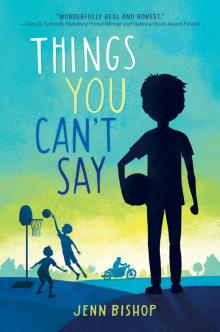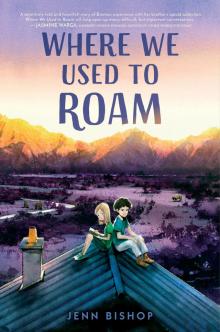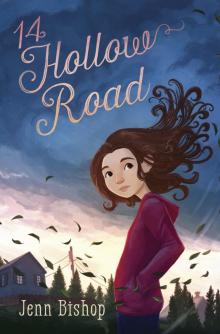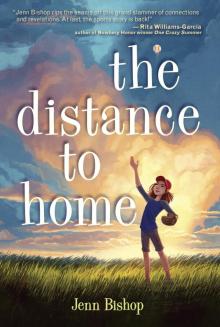- Home
- Jenn Bishop
Where We Used to Roam
Where We Used to Roam Read online
Praise for Things You Can’t Say
“A touching and believable story about the ways worries feed on each other, the difference that honesty makes to kids, and how much emotional growth a child Drew’s age can experience in just a few weeks.” —Publishers Weekly
“A thoughtful examination of the slow, uneven recovery that follows a devastating loss.” —Kirkus Reviews
“A sensitive exploration of suicide, forgiveness, and the difficulty of navigating friendships.” —Booklist
“Bishop’s emotional novel may provide a way for readers whose lives have been impacted by suicide to navigate a complex topic and will appeal to those who appreciate tales of trauma and healing.” —SLJ
“With a deft, sympathetic hand, Bishop relates Drew’s struggles to define his own identity while coming to terms with the man his father was.” —BCCB
For everyone who’s a little lost and looking for their herd
It could be an adventure. That’s what Mom told me not even a week ago. But as I stare out the tiny smudged window at the airline worker below as he tosses suitcase after suitcase on the conveyor belt headed for my airplane, I only feel like I’m running away. From what’s happening with my brother. From what I did to Becca. From everything.
And not the kind of running away we did as little kids, where you pack your backpack with your favorite snacks, a sweatshirt, and a stuffed animal before hiding out in a neighbor’s yard, but the real kind. Putting two thousand miles between yourself and everything and everyone you know.
A tall guy who can’t be much older than Austin, with dark brown skin, gentle eyes, and a Boston College men’s basketball sweatshirt, slides into the seat next to me. “Sorry,” he says, with no choice but to spread his legs open, his knee knocking into mine. “They were all out of exit-row seats.”
I pivot my legs toward the window and out of his way. “No worries,” I say. “Do you play?” I gesture to his sweatshirt.
“Yeah,” he says. “Forward. You?”
I can’t help but laugh at the suggestion. “No, but my brother, Austin, he…” Used to. The words slip out of my grasp. He will again, I tell myself. Thirty days on Cape Cod is going to fix him. It has to.
“Cool, cool,” he says before slipping red headphones over his ears.
Soon, the plane is filled up. All these people headed to Denver or even farther away. Like me. Except, probably not like me. I bet they’re on vacation or traveling for business. Or going home for the summer now that all the colleges around Boston have let out.
When it’s time for takeoff, I shut my eyes tight, but this time when I close them, all I see is my brother in the upstairs hallway. Austin, with his hand in a fist. How mad he looked, but not at me—at himself.
I don’t like that Austin, can’t look at that version of him anymore. I open my eyes and peer out the window as the plane dips to the left and the deep blue water of the Atlantic Ocean glimmers in the sun. I reach down, loosen the straps on my Birkenstocks, and rest my feet on my backpack. The vibrations from the engine travel up through my whole body, like they’re trying to soothe me.
The plane levels off, and we head west over the city. The skyscrapers downtown suddenly don’t seem so tall. Down below, I spy the green lawn of Boston Common, the muddy water of the Charles, the stone buildings on the Harvard campus.
Becca must be down there somewhere, at the camp she goes to every summer with her fellow geniuses. All the other summers, she’d complain, wishing I could accompany her. But this summer?
No, this summer I’m sure she’s glad to be away from me and everyone else from our school. Happy for a fresh start after how I ruined her life.
I rummage through my backpack for my sketchbook, flip it open to a clean page, and wipe my sweaty palms on my lap before uncapping my pen.
Dear Becca, I write, before stopping to stare out the window again. Everything’s so small, like a dollhouse world. Tiny Matchbox cars zipping down the Mass Pike. From up here you can’t see the people inside. From up here it looks perfect.
That’s how my life used to be. I didn’t realize it until now—didn’t have anything else to compare it to—but it was.
I close my eyes again, but now all I see is that look on Becca’s face, almost like I’d slapped her. It was my chance to apologize, to try to make things right, but all I did was make things worse. Me and my big mouth. Guess all that time hanging out with Kennedy finally wore off on me.
I press my pen to the paper. I’m sorr—
Some turbulence sends the pen jumping across the page, leaving a huge scribble behind. I close the notebook, put the cap back on the pen. I can write to her later. I have the whole flight. The whole summer, really.
Two months to figure out how to fix the mess I made.
SEVEN MONTHS EARLIER
CHAPTER ONE
Maybe everything could have been different if Ms. Patel—sorry, Nisha—had never approached me in art class. Not that any of what happened after is her fault. It’s just that something—someone—had to be the first domino to fall. The one that sent all the others toppling. And if I think back, it was that moment that set it all into motion.
At least as far as Becca was concerned.
It was seventh period, the last class of the day before Thanksgiving break. But you wouldn’t have been able to tell from peeking into the art room on that gray day. Ms. Patel always had music playing in her room—a mix of her own CDs and student iPhones plugged into her speaker system.
We’d rotated into art only a few weeks earlier with the start of second quarter, so I still didn’t know her that well, but already I liked her a whole lot more than Mr. Morris, who we’d had for health last quarter. Seemed like his job was mostly to scare us away from trying drugs.
I was half listening to the music, some kind of punk mix that my brother would probably be into, while I worked on my portrait drawing. Instead of randomly pairing us with other students in the class—the definition of awkward—Ms. Patel asked us to bring in a photograph of a family member or a loved one. “No celebrities,” she’d said when Teagan Washington tried to pass off a picture of Timothée Chalamet as a “distant cousin.”
The one I’d been bringing to life the past few classes was a photo of my brother. A snapshot Dad had taken at one of Austin’s football practices this summer. Austin and his teammates were goofing off on the sidelines. It was one of those rare pictures that truly looks like the person. Every time I look at a photo of myself, it never quite matches up to the me I see in the mirror. The me I’m used to. And maybe mirror me isn’t real me after all. But still.
I was shading in the laugh lines around Austin’s eyes when Ms. Patel stopped behind me. Her curly black hair was always up in a messy bun, and she had the kind of funky plastic glasses you’d expect on an artist. Like she’d picked them out because she wanted to look interesting, rather than pretty.
“Nice work, Emma,” she said. “That your older brother?”
I nodded, not stopping working just because she was there. There were only a few minutes left before the bell would ring, and I wanted to finish his eyes.
“I can see the resemblance.” She picked up the photograph. Her fingers were flecked with paint—metallic blue and burnt umber.
“Really?” I set my pencil down.
“Absolutely. It’s all about the composition—how your nose, eyes, and mouth relate to each other. The exact same proportions.”
My heart sank a little. It wasn’t like I wanted my art teacher to tell me I was beautiful or something. That would be weird. And it’s not like I think my own brother is attractive. Also weird. But there are some things you kind of figure out from living in the world, from seeing how people react to other peopl
e. Austin was one of those shiny people. The kind everyone paid attention to when he walked into a room. Mom and Dad, too.
But me? No one had ever really noticed me that way. I blended in with the scenery.
“You know,” Ms. Patel said, setting the photo back down, “we’re always welcoming new folks to art club. You should come sometime and see what it’s like.”
“Even in the middle of the school year?”
“Especially in the middle of the school year. So much of middle school is new, and it can take a little while to find your place. Have you taken art classes before? Private lessons?”
“Nope,” I said. Though we live in the kind of Boston suburb where everyone’s been taking lessons in something—or five somethings—since they were in diapers, Mom and Dad were never super into that with me and Austin. Between Dad’s job as a meteorologist at the TV station and Mom buying Happy Feet when I started kindergarten, there wasn’t anyone left to ferry us around in the afternoons. Austin had his teammates’ parents to take him to sports practices, and me? When I wasn’t over at the Grossmans’ house with my best friend, Becca, my after-school activity was hiding out in Mom’s office in the back of the running store. Drawing in my notebook, surrounded by boxes of the latest New Balance and Asics.
“You’re quite talented for being self-taught,” Ms. Patel said as the bell rang. “I hope you’ll consider coming, Emma. And not that I need to seal the deal, but I do provide brownies.”
My mouth watered. “Maybe,” I said with a smile, not wanting to give away how much she’d already sold me on it. “Have a nice Thanksgiving!” I slipped my drawing into my folder.
“You too, Emma. Hope to see you Tuesday!”
After stopping by my locker, I met Becca outside the school, by that one maple tree where we always met to walk home together. She was so glued to the book she was reading, she didn’t even notice me at first.
“Becca?” I said finally.
“Sorry!” She tucked in her bookmark. “Mrs. Hanson saved it for me. It doesn’t come out till next Tuesday, but she said so long as I don’t tell anyone.”
“Even me?” I said as we began our walk home.
“Well, you know! You don’t really care about books.”
Ouch. She wasn’t wrong. It’s not like I never read, but if you were going to compare me to Becca, it was no contest. No one at our middle school read more than Becca Grossman. Not even Mrs. Hanson, the middle school librarian. And that’s saying a lot because I’m pretty sure I overheard Mrs. Hanson saying she read more than three hundred books in a single year.
“Why is this one so special?” I asked.
“It’s the fifth and final one in the series.” Becca pouted. “Though, maybe if us fans clamor enough, we can get the author to put out a novella or something. It’s happened before! I know what I’m doing over break.” She hugged the book to her chest.
“Or tonight, if I know you.”
“But then I’ll probably reread it a few times. Put some stickies on my favorite scenes.”
“We can still go to the movies though, right?”
“Definitely,” Becca said as she adjusted her glasses. “I need to give my eyes a break sometime.”
“So,” I said, shoving my hands in my pockets. “I think I might check out art club next week.”
“Art club?” Becca wrinkled her nose.
“What’s so wrong with art club?”
“The kind of people who do art club,” Becca said, as if it were a certified fact that the people who do art club are weirdos.
I got this strange feeling in my stomach then. Did my wanting to do it mean she felt that way about me, too? Just a little?
“But I don’t know who does art club,” I said. “Not for sure. I haven’t even gone yet.”
“You should’ve signed up for Battle of the Books back in September. But hey, you could still do Forensics with me! That doesn’t start for a few more weeks.”
I had been interested in Forensics. But that was before I realized it wasn’t like CSI at all. Once I learned it was about giving speeches, no thanks!
When we first visited the middle school as fifth graders back in the spring, I’d been so excited. There were tons more after-school activities than we had in elementary, and since the middle school was walking distance from my house, it didn’t matter anymore that no one was around to drive me. Becca and I, we could just walk home.
But here we were, more than a quarter into the school year, and I hadn’t signed up for anything. It was easier for Austin. When you do sports, it’s all figured out for you. Fall was for football, then he had basketball all winter, and track in the spring. I promised Mom I’d try spring track, but right now spring felt a long way away. And Becca did a million activities. I needed something.
“I don’t know,” I said.
“What about math club? You’re good at math.”
She wasn’t wrong. It was my best subject. Well, after art. I’d just never had a chance to do art for a grade. Still, I wasn’t nearly as good at math as Becca, who was taking it at the high school.
“Maybe,” I said as we waited at a crosswalk. But it was entirely different from the “maybe” I’d given Ms. Patel just fifteen minutes ago.
If I wanted to do something, why did it matter whether or not Becca was on board?
CHAPTER TWO
It was my brother who spotted the shadow boxes first. Just over two years ago, when the four of us went to Chicago when my mom ran the marathon. Dad was never good at standing around quietly and looking at stuff, so Austin was always the one who’d go with me to museums.
We’d taken selfies at the Bean and left Dad to explore Millennium Park while Austin and I checked out the Art Institute.
“You ever hear of this guy, Em? Joseph Cornell?” Austin had stopped in front of a box on the wall. It reminded me of the dioramas we made for school projects sometimes, except this one was different. For one, it wasn’t cardboard. It had a glass front and wooden sides, and in the back was a piece of wood with a hole cut out, the kind of thing you might peek through. Sitting on the bottom of the box was a small globe, a little blue cube, and a red bead. “Guess he was a collector, too.”
The Art Institute had dozens of these shadow boxes by Joseph Cornell. Some with layers of text, almost like decoupage. Several with birds and owls. One with a creepy naked doll. I was immediately obsessed with them. I couldn’t get over how the way he’d arranged these objects in a box seemed to tell a story. Or give you a feeling. It was so much more than just some random stuff in a box. And at the same time, it was exactly that.
Ever since I was little I’d held on to things. Mom wasn’t one of those minimalist moms, and she was never really strict about what Austin and I did with our bedrooms. Beneath my bed and in my closet were boxes of stuff I’d saved. When we got back home from Chicago, I made my first-ever shadow box with some of my treasures from when I was little. A lovey that had made a few too many trips through the washing machine and dryer. One of those trinkets I’d begged Dad for a quarter to buy at the grocery store—a miniature plastic person. And three shiny pennies. According to Dad, Grandpa Bill had let me go through his wallet when I was little and I had asked him, 100 percent serious, if when he was very, very old and about to die, I could have the three shiny pennies. They’d all had a good laugh and Grandpa Bill gave them to me that day.
I glued them to the back of the box, the way I’d noticed Joseph Cornell did in some of his boxes, and laid out the other items on the bottom.
Dad helped me hang the shadow box on the wall in my bedroom like it was in a museum. “My very own Joseph Cornell,” I’d said.
Dad corrected me. “Your very first Emma O’Malley. You never know, Em. This could be worth something one day.”
I laughed him off. Probably blushed, too. But ever since, when I think of that moment and how my dad took me seriously, I realize how lucky I am. There aren’t a whole lot of other kids in my school whose parents would b
e okay with them wanting to be an artist. At least, I don’t think. No, most people’s parents want them to be doctors or lawyers, or to work in tech. Even though Becca loves reading more than life itself, she already knows she wants to be a doctor when she grows up, like her parents.
The Saturday after Thanksgiving, I was up late, working on my latest shadow box. A playlist was on softly in the background.
When she was doing the dishes after the big meal, Mom accidentally dropped one of her favorite plates, a delicate crystal one she’d inherited from her great-grandmother, and it shattered into dozens of pieces. She was about to throw it away when I asked if I could have it for one of my boxes. “So long as you’re careful and don’t cut yourself,” she’d said with a smile. “I mean it. No trips to the ER for your art, please.”
Mom’s birthday was in January, and I figured I could make a box for her, though I still hadn’t decided what exactly would go in it besides the mosaic background I’d been imagining, made out of the fragmented glass.
Downstairs, I could hear the front door close. Austin had just come home.
I peeked my head out the door as he passed my room.
Austin jumped. “You scared the crap out of me, Em. Why are you still up? It’s one in the morning.”
Was it really that late? “I was working on a box.” I followed him into his room. He grabbed a sweatshirt that had been dumped on his desk and kicked off his sneakers. The air around him smelled funny, sort of like a skunk.
“What do you think this is, a sleepover?” He laughed, settling down on his bed and nestling his head into a pile of pillows. Mom didn’t make either of our beds anymore—that was up to us after third grade—which meant Austin’s bed was never, ever made unless his girlfriend, Savannah, was coming over.
“I’ll leave in a minute.” I sat down at the edge of his bed. “Was it fun?”
“Hmmm. Are parties fun? Let’s see…”

 Things You Can't Say
Things You Can't Say Where We Used to Roam
Where We Used to Roam 14 Hollow Road
14 Hollow Road The Distance to Home
The Distance to Home